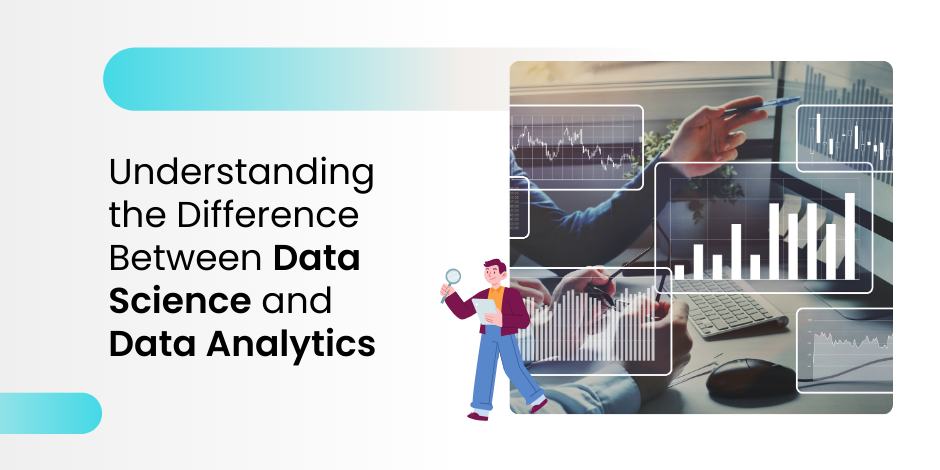Understanding the Difference Between Data Science and Data Analytics

Stay Informed With Our Weekly Newsletter
Receive crucial updates on the ever-evolving landscape of technology and innovation.
Data science and data analytics are closely related fields crucial in today’s data-driven world.
While these terms are often used interchangeably, they have distinct differences and unique applications.
Understanding the basics: Data Science and Data Analytics

Before we explore the differences, let’s first clearly understand what data science and data analytics entail.
Data science and data analytics are rapidly growing fields in technology and business.
They involve working with data to gain insights but have different focuses and approaches.
What is Data Science?
Data science is a multidisciplinary field encompassing various techniques, including machine learning, statistical analysis, data mining, and data visualization.
Data scientists are like detectives, using their strong mathematical and statistical skills to uncover data patterns, trends, and correlations.
They start by collecting and organizing data from various sources, such as databases, APIs, and web scraping.
Then, they clean and preprocess the data to remove any inconsistencies or errors.
Once the data is ready, data scientists employ advanced programming languages like R and Python to manipulate, analyze, and visualize large datasets.
What is Data Analytics?
Data analytics, on the other hand, focuses on the analysis and interpretation of data to derive meaningful insights that help organizations make informed decisions.
It is more business-oriented and aims to solve specific problems or answer specific questions using data.
Data analysts primarily work with structured data organized in a tabular format, such as spreadsheets or databases.
They use statistical techniques, such as regression analysis or hypothesis testing, to uncover patterns, identify trends, and answer specific business questions.
They employ various tools, such as SQL and Excel, to extract, clean, and transform data for analysis.
Data analytics is widely used in retail, finance, and marketing industries.
For example, in retail, Data Analysts can analyze customer purchasing patterns to identify opportunities for cross-selling or upselling.
They can analyze market trends to develop investment strategies or assess credit risk in finance.
While data science and data analytics have distinct focuses, there is some overlap between the two fields.
Both involve working with data and using statistical techniques to gain insights.
However, data science tends to be more exploratory and focused on developing predictive models, while data analytics focuses more on answering specific business questions.
Key differences between Data Science and Data Analytics

While both data science and data analytics involve working with data, there are significant differences in their primary focus, methodologies, and toolsets.
The Role of a Data Scientist vs a Data Analyst
A data scientist’s role is centered around designing and implementing algorithms and models that facilitate data-driven decision-making.
They develop sophisticated machine learning models, build predictive analytics systems, and employ artificial intelligence techniques to solve complex problems.
On the other hand, data analysts primarily play a descriptive role by analyzing historical data, creating reports, and generating visualizations to support business objectives.
Techniques in Data Science and Data Analytics
Data scientists utilize various tools and techniques, including advanced statistical methods, machine learning algorithms, and big data technologies.
They work with programming languages like Python, R, and Scala and leverage frameworks such as TensorFlow and PyTorch.
On the other hand, data analysts rely on Excel, SQL, and visualization tools like Tableau and Power BI to perform data analysis and reporting.
Skills required for Data Science and Data Analytics
Professionals must possess technical and soft skills to excel in either data science or data analytics.
Essential Skills for a Data Scientist
A data scientist must have a strong foundation in mathematics, statistics, and computer science.
Proficiency in programming languages such as Python and R and expertise in machine learning algorithms and statistical modeling are crucial.
Additionally, data scientists should have excellent problem-solving skills, the ability to communicate complex findings to non-technical stakeholders, and a passion for continuous learning and exploration.
Essential Skills for a Data Analyst
Data analysts should have a solid understanding of statistics, data manipulation, and data visualization techniques.
Proficiency in programming, particularly SQL, and tools like Excel are necessary.
Good communication skills, attention to detail, and the ability to interpret data accurately and effectively are vital attributes of a successful data analyst.
Data Science and Data Analytics: career prospects
Both fields offer promising career prospects in various industries.
Job opportunities and salary prospects in Data Science
The demand for data scientists is rising, with organizations across sectors recognizing the value of data-driven decision-making.
Skilled data scientists are in high demand from healthcare to finance, e-commerce to marketing.
Job opportunities and salary prospects in Data Analytics
Data analytics also offers a wealth of career opportunities. Data analysts are sought after by organizations looking to gain insights from data and make informed decisions.
Consulting, market research, and technology industries rely heavily on data analysts to analyze and interpret data.
Choosing between Data Science and Data Analytics

Deciding on a career path can be daunting, but understanding your interests, strengths, and career goals can help guide your decision-making process.
Factors to consider when choosing your career path
A passionate curiosity for exploring and extracting insights from complex datasets is crucial when considering a career in data science.
In contrast, data analytics may be the right fit if you enjoy working with structured data and are interested in translating data into actionable insights for businesses.
Evaluating the technical skills required, your educational background, and the level of expertise you wish to develop can further aid in making an informed decision.
The Future of Data Science and Data Analytics
Data science and data Analytics are ever-evolving fields that show no signs of slowing down.
With the exponential growth of data and the increasing demand for data-driven decision-making processes, both disciplines will continue to play a pivotal role in shaping the future of industries.
Those with strong analytical skills and a passion for extracting insights from data will find themselves at the forefront of innovation and opportunity.
Conclusion
Whether you pursue a career in data science or analytics, both offer exciting prospects, intellectual challenges, and the opportunity to impact today’s data-driven world significantly.
Ultimately, the choice lies in your interests, skillset, and desired contributions to the field.
So, embark on this journey, equip yourself with the necessary skills, and embrace the exciting possibilities that await in data science and analytics.
Ready to launch your career?
The Institute of Data’s Data Science & AI program offers practical, hands-on skills essential for a career in data science.
Ready to learn more about our programs? Contact one of our local teams for a free career consultation today.




